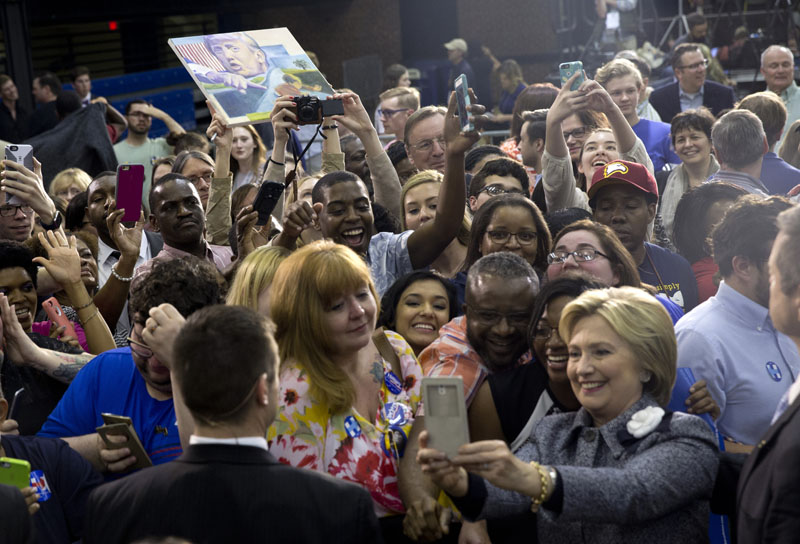Trump, Clinton facing decisive day in 2016 campaign
WASHINGTON: Republican Donald Trump and Democrat Hillary Clinton could emerge from Tuesday's primary elections in five US states as presumptive presidential nominees, setting in motion a one-on-one race in the most chaotic American political contest in years.
Trump entered the voting embroiled in one of the biggest controversies of his contentious campaign. The billionaire real estate baron has urged supporters to physically confront protesters at his campaign events and now faces criticism for encouraging violence after skirmishes broke out at a rally last week in Chicago.
During an event Monday in Florida, Trump was interrupted by protesters. Some were forcibly removed. Trump said he didn't want to "ruin somebody's life, but do we prosecute somebody like that?"
Florida and Ohio are the biggest prizes Tuesday, but Missouri, Illinois and North Carolina are also awarding a large cache of delegates to the parties' national nominating conventions.
While Trump could take all five states Tuesday, that still would not assure he goes into the Republican convention this summer with the needed majority of delegates. His closest competition has come from Texas Sen. Ted Cruz, who has won in seven states. Trump also must overcome Florida Sen. Marco Rubio and Ohio Gov. John Kasich, who are battling for their political life in their home states Tuesday.
Clinton, once seen as the clear favorite for the Democratic nomination, still faces a challenge from Vermont Sen. Bernie Sanders, who has shown surprising staying power after pulling off an upset victory in the industrial state of Michigan and is trying to build momentum in the Midwest.
Trump holds a comfortable lead in the Republican delegate count. If he sweeps Tuesday's contests, he would cross an important threshold by collecting more than 50 percent of the delegates awarded so far.
While polls show Trump leading Rubio in Florida's winner-take-all contest for 99 delegates, Kasich holds a narrow lead in Ohio, where 66 delegates are at stake.
That makes Ohio the key state in determining whether Trump puts himself on a path to winning the nomination by the end of the primary season on July 7. A loss there means the race could result in a contested convention.
Among Democrats, Clinton urged Democrats to unite behind her bid to focus on Trump. At a Monday rally in Chicago, Clinton said, "We have the way forward to be able to start talking about not only unifying the Democratic Party but unifying our country."
If Clinton comes out of Tuesday's contests with decisive wins in several states, it would be difficult for Sanders to catch her because all the state Democratic nominating contests allot their delegates proportionally.
The violent atmosphere at some Trump events has deepened concern over his candidacy in some Republican circles. Rubio and Kasich have suggested they might not be able to support Trump if he's the nominee, an extraordinary stance for intraparty rivals.
"I think the candidates need to take responsibility for the environment at their events," House Speaker Paul Ryan, a leading Republican, said during an interview Monday. "There is never an excuse for condoning violence, or even a culture that presupposes it."
Trump has denied playing any role in encouraging violence against protesters.
Trump went into Tuesday's contests with 460 delegates to 370 for Cruz, 163 for Rubio and 63 for Kasich. It takes 1,237 delegates to win the Republican nomination.
Clinton headed into Tuesday's primary with 768 pledged delegates compared to 554 for Sanders, according to a count by The Associated Press. Including superdelegates, elected officials and party insiders who are free to choose any candidate, Clinton has 1,235 total delegates, more than half the amount needed to clinch the nomination, while Sanders has 580.






